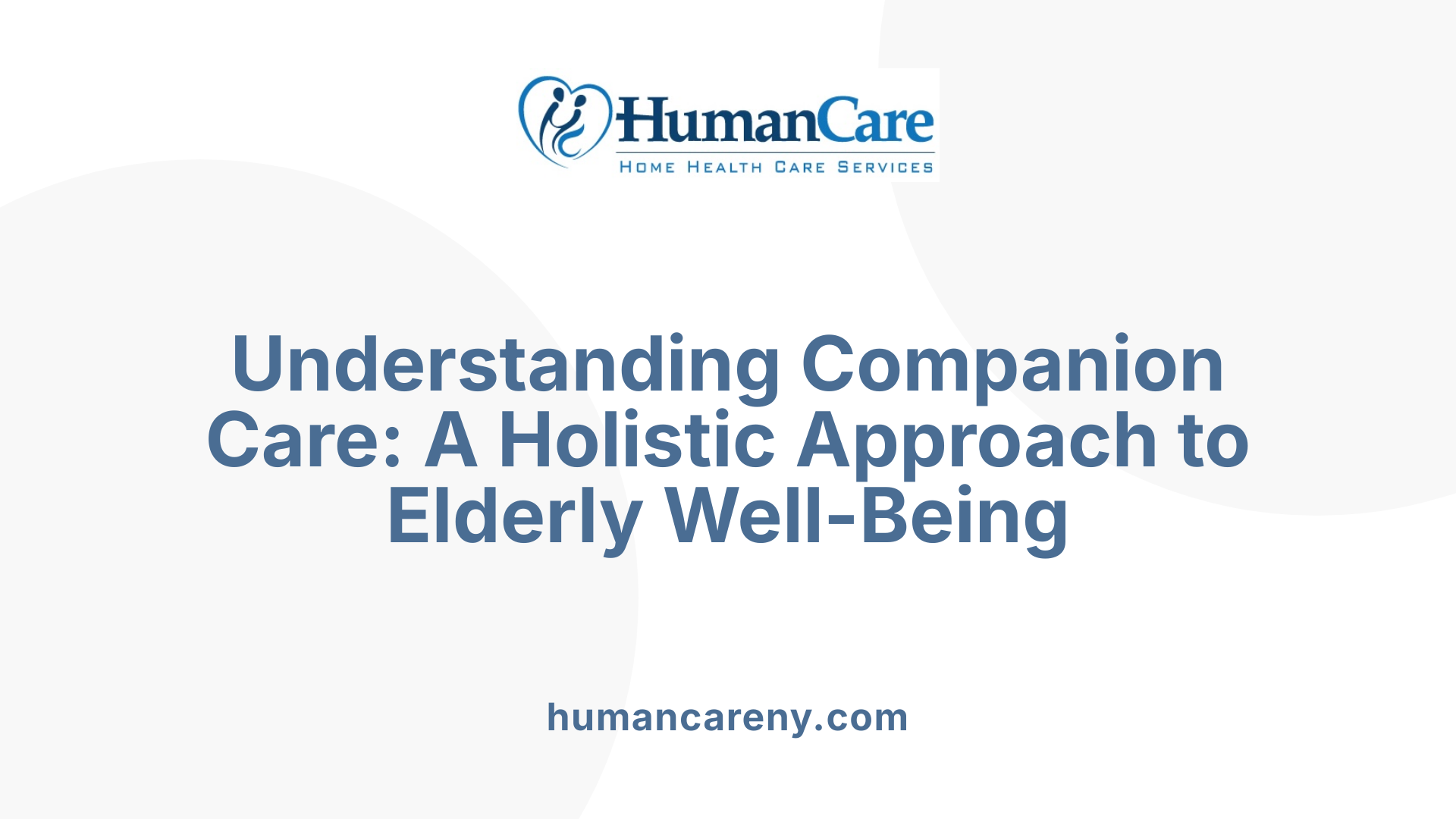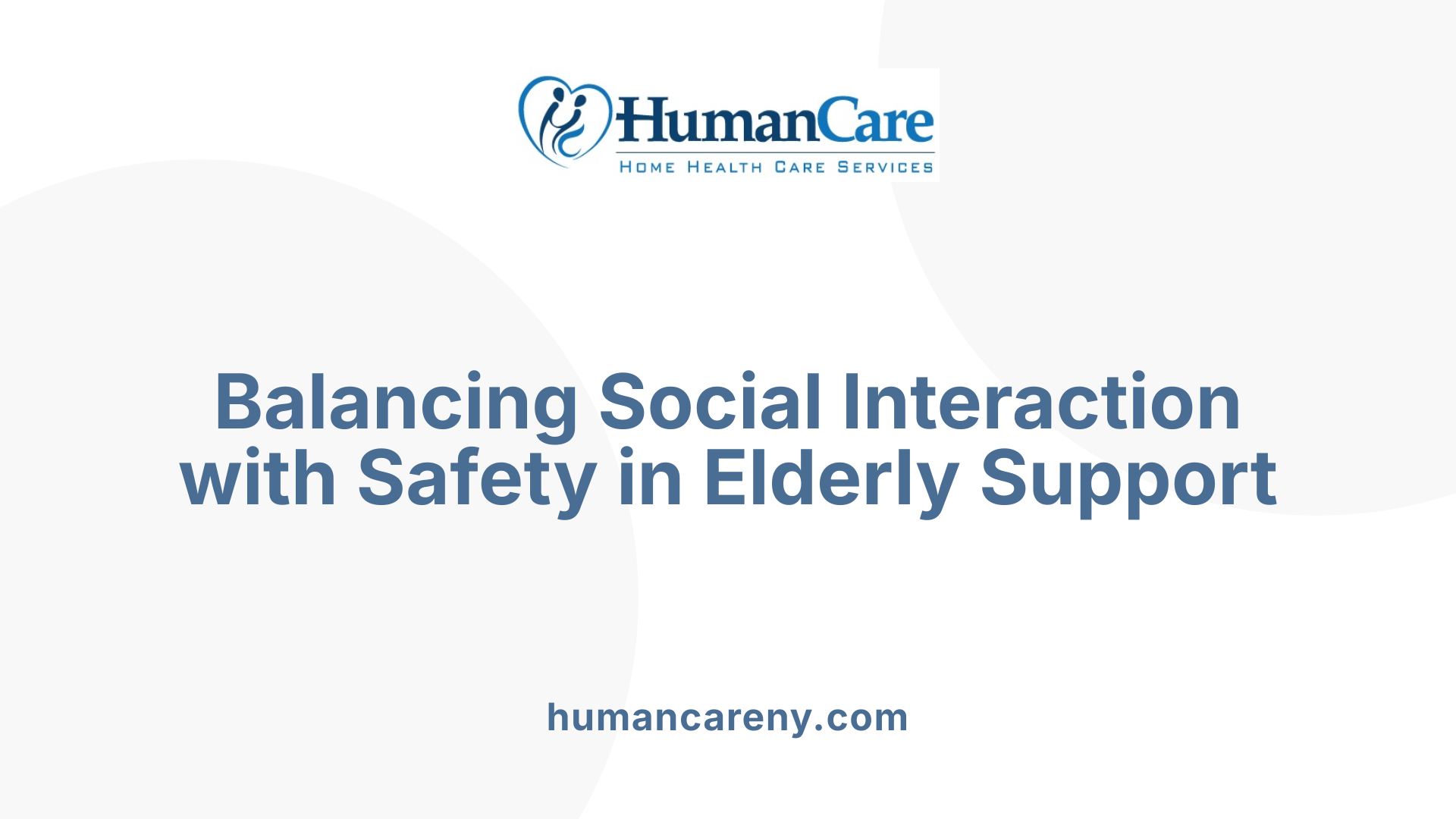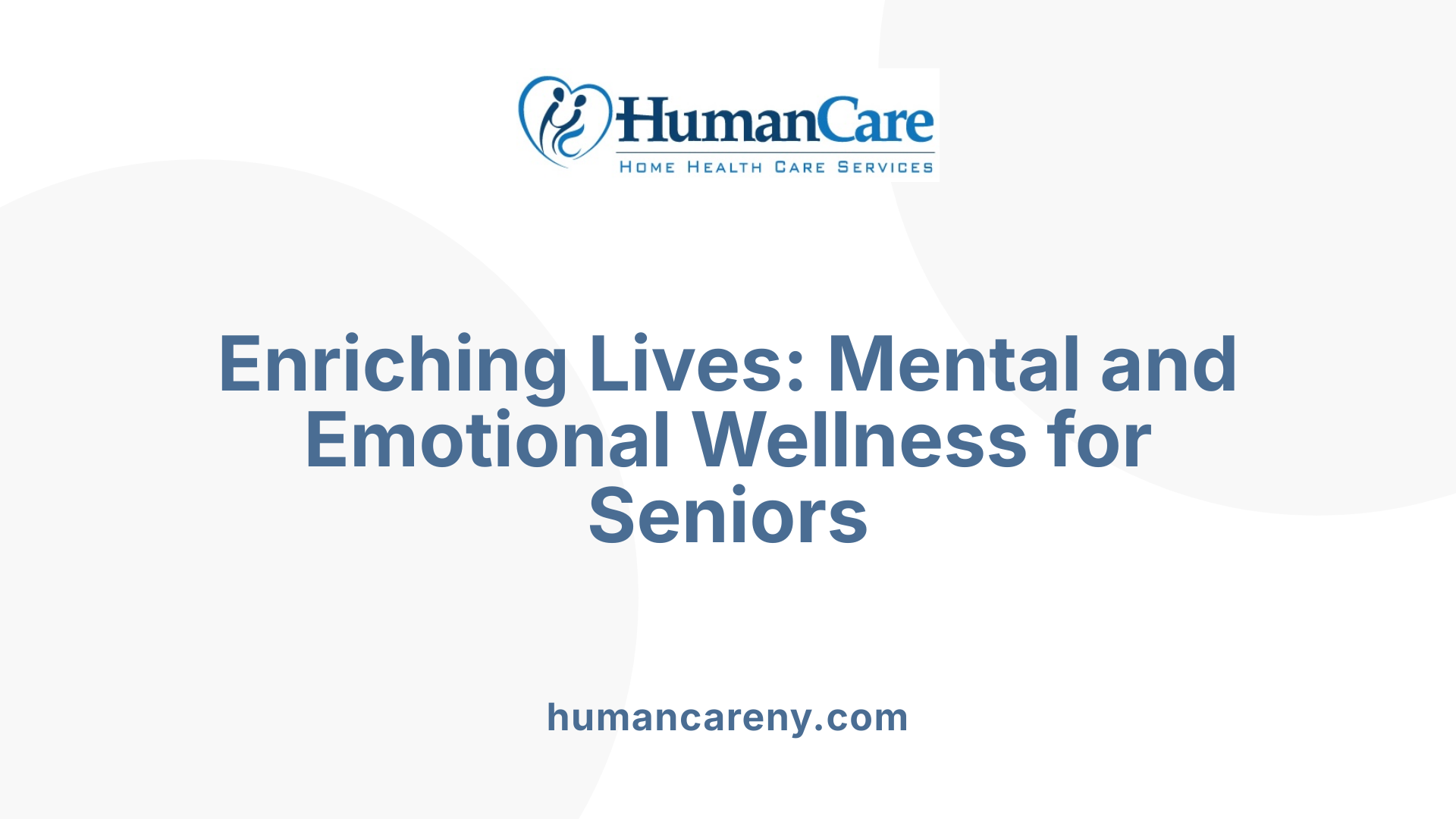Understanding the Role of Companion Care in Senior Living
As the aging population grows, the need for specialized support that promotes safe and fulfilling lives becomes increasingly vital. Companion care emerges as a crucial service dedicated to not only fostering social and emotional well-being but also enhancing safety for seniors living independently. This article explores how companion care provides essential companionship and safety, contributing to better health outcomes and improved quality of life for older adults.
What Is Companion Care and Its Supportive Role in Elderly Lives

What is companion care and how does it support elderly individuals?
Companion care is a form of non-medical home assistance tailored to meet the social, emotional, and everyday needs of older adults who are relatively healthy and independent but may benefit from some extra help. This care approach emphasizes building genuine relationships that foster mental, emotional, and social well-being.
Companion caregivers provide more than just practical help; they are there to offer friendship, companionship, and emotional support. They assist with daily activities such as meal preparation, light housekeeping, transportation, running errands, and scheduling appointments. Their presence helps seniors stay engaged in social activities, encouraging interaction, physical activity, and mental stimulation.
While companion caregivers do not have medical training and cannot administer medications or provide medical treatments, they support overall well-being by maintaining routines, encouraging communication, and helping seniors feel valued and included. This support is vital in reducing loneliness and social isolation, which are significant risk factors for mental health issues like depression and cognitive decline.
By working closely with families, companion caregivers develop personalized care plans that respect an individual's preferences and lifestyle. These plans include engaging activities, social outings, and everyday tasks designed to promote independence, safety, and happiness.
Overall, companion care creates a safe, comforting environment that helps older adults age in place comfortably. It supports their independence by enabling them to continue living at home while enjoying social interactions and emotional stability, ultimately enhancing their quality of life.
The Crucial Importance of Companionship in Elderly Well-Being

Why is companionship important in elderly care?
Companionship plays a vital role in supporting the overall health and happiness of older adults. For seniors who are relatively healthy and independent, companionship helps prevent feelings of loneliness and social isolation, which can have serious health implications. When seniors engage regularly with caring, friendly companions, they experience emotional support that nurtures a sense of belonging and purpose.
Research shows that loneliness is linked to negative health outcomes, including depression, increased blood pressure, and cognitive decline. Regular social interactions not only boost emotional well-being but also encourage mental stimulation through conversations, activities, and shared experiences. Building trusting relationships with caregivers or family members fosters feelings of being valued and respected, which enhances emotional resilience.
Companionship also promotes physical health by encouraging seniors to stay active. Whether it’s going for walks, participating in hobbies, or simply sharing a cup of coffee, these interactions help seniors maintain independence and improve their overall quality of life. The presence of a trusted companion provides reassurance, safety, and emotional comfort, especially during health issues or life transitions.
In summary, companionship in elderly care is essential because it helps mitigate the risks associated with social isolation, supports mental and emotional health, encourages active lifestyles, and fosters meaningful relationships—contributing significantly to a happy, healthy, and fulfilling life for seniors.
How Companion Care Combines Social Engagement with Safety Measures

How does companion care provide both companionship and safety for elderly individuals?
Companion care offers a holistic approach to supporting older adults by blending emotional connection with safety oversight. Caregivers spend quality time with seniors, engaging in meaningful conversations, hobbies, or outings. This regular interaction helps reduce feelings of loneliness and social isolation, which are associated with mental health issues like depression and cognitive decline.
In addition to social activities, companions assist with essential tasks such as light housekeeping, medication reminders, and transportation. These activities ensure that the living environment remains safe and that daily routines are maintained comfortably.
An important aspect of companion care is safety monitoring. Caregivers are trained to identify potential hazards in the home, assist with physical activities, and respond promptly in emergencies. This proactive safety oversight provides peace of mind for both seniors and their families.
By fostering social bonds and safeguarding physical well-being, companion care enables seniors to live independently with dignity, enhancing their overall quality of life. Combining these elements creates a supportive environment where emotional needs are met alongside safety concerns, promoting a healthier, happier aging experience.
Enhancing Safety and Well-Being Through Personalized Support
How does companion care enhance safety and well-being for seniors?
Companion care plays a vital role in promoting a safe and healthy environment for older adults who are relatively independent but still need some assistance. Caregivers help with daily routines like meal preparation, light housekeeping, and transportation, which can prevent accidents such as falls or injuries.
Beyond physical safety, companion caregivers contribute significantly to mental and emotional health. They offer friendship, engage in meaningful conversations, and encourage social activities like walks, community outings, and hobbies. This interaction helps reduce loneliness and social isolation, common issues among seniors that can lead to depression and cognitive decline.
Companion care also supports medication reminders and safety monitoring. In case of emergencies, caregivers can promptly alert family members or emergency services, ensuring prompt response. Their presence provides reassurance and emotional support, making seniors feel valued and secure.
Activities like outdoor walks and social visits not only keep seniors physically active but also foster a sense of purpose and independence. This holistic approach ensures that older adults remain engaged, emotionally fulfilled, and safe in their own homes.
Development of individualized care plans
A core aspect of effective companion care involves creating customized care plans. These plans are developed based on thorough assessments of the senior’s routines, health status, personal interests, and preferences. Family input and detailed evaluations guide these plans, ensuring that each individual’s unique needs are met.
Care plans include specific activities, safety measures, and emotional support strategies. Regular updates and adjustments are made to reflect changing health conditions or personal goals, maintaining the relevance and effectiveness of the care.
Safety protocols and caregiver training
Professional companion caregivers undergo background checks and receive ongoing training on safety procedures and appropriate boundaries. They are instructed on how to assist with light physical activities, home safety assessments, and emergency response protocols.
These caregivers are trained not just to build rapport but to recognize situations requiring medical attention or further assistance, even though they do not perform medical tasks themselves. Ensuring caregivers are well-prepared helps prevent accidents and promotes an environment of safety.
Monitoring health and safety in daily routines
Daily routines are closely monitored by caregivers who observe for signs of health issues or hazards within the home. They help with medication reminders, ensuring medication is taken correctly and on schedule, which supports proper health management.
Caregivers also facilitate regular physical activities like walks or stretching, which promote mobility and prevent stiffness or decline. They conduct safety checks in the home to identify potential fall hazards, such as loose rugs or clutter, and assist in maintaining a safe, accessible environment.
| Aspect | Focus | Additional Details |
|---|---|---|
| Personalized Care Plans | Development based on individual routines and preferences | Adjusted regularly; includes activities, safety, emotional needs |
| Safety Protocols | Background checks, ongoing training, emergency procedures | Ensures caregiver competence and safety awareness |
| Routine Monitoring | Health signs, medication adherence, home safety checks | Regular assessments to prevent accidents and health decline |
The Role of Caregivers and Safety Protocols

Background checks and training for caregivers
Ensuring the safety and trustworthiness of companion caregivers begins with thorough background checks. Reputable agencies perform employment record reviews and criminal background screenings before hiring caregivers. Additionally, caregivers undergo training that covers essential skills like communication, understanding seniors' needs, and recognizing the limits of their role.
Ongoing oversight and care plan adjustments
Care agencies typically provide ongoing oversight to ensure caregivers adhere to safety standards and personalized care plans. These plans are tailored to each senior's routines, preferences, and needs, and may be adjusted over time based on feedback from the senior or their family. Regular monitoring and updates help maintain high-quality, responsive care.
Recognizing safety risks and emergency response
Companion caregivers are trained to identify safety risks such as fall hazards and home safety issues. They also know how to respond effectively during emergencies, whether it's a fall, medical issue, or fire. This training ensures that seniors receive prompt assistance, reducing the risk of serious injury and providing peace of mind for families.
| Aspect | Description | Additional Details |
|---|---|---|
| Background Checks | Verify caregiver trustworthiness | Criminal history, employment records |
| Caregiver Training | Equip with safety and communication skills | Role boundaries, emergency procedures |
| Oversight | Continuous evaluation and care plan updates | Regular reviews, feedback sessions |
| Emergency Response | First aid, fall prevention, safety protocols | Incident handling, safety assessments |
Supporting Mental and Emotional Health for a Richer Senior Life

Activities that promote mental stimulation
Engaging activities like puzzles, reading, or playing games help keep the mind sharp. Companion caregivers often facilitate these activities during visits, encouraging seniors to think, learn, and stay curious.
Building purposeful routines
Consistent routines, such as daily walks, meal times, or hobbies, create a sense of stability. Regularly scheduled activities give seniors a feeling of normalcy and safety, reducing anxiety.
Connecting activities with emotional well-being
Social interactions like conversations, outings, or participating in social events boost emotional health. These moments foster a sense of belonging and purpose, helping seniors feel valued and engaged.
| Activity Type | Benefits | Additional Details |
|---|---|---|
| Mental exercises | Improve cognitive function | Puzzles, reading, games |
| Physical routines | Enhance well-being | Daily walks, light exercise |
| Social outings | Reduce loneliness | Social visits, community events |
| Hobby involvement | Promote purpose | Gardening, crafts, hobbies |
Supporting mental health through these engaging activities and routines is vital for seniors. It enriches their lives, fosters emotional stability, and helps maintain independence, all while creating joyful, meaningful experiences.
Fostering Independence and Happiness in Elderly Care
Effective companion care is a holistic approach that enriches the lives of seniors by combining emotional support, social engagement, and safety measures. It promotes independence, mental acuity, and emotional health, enabling older adults to live comfortably and confidently in their own homes. As a vital component of elderly care, companion services ensure that seniors are not only cared for but truly valued and supported in their daily lives.
References
- Companion Care for Older Adults: What to Consider?
- THE COMPLETE GUIDE TO COMPANIONSHIP SERVICES
- Is Companion Care Right for Your Loved One?
- Companion Care for Seniors - Uplifting Care and Friendship
- How Companion Care Improves Emotional Well-Being in ...
- The Benefits of Companion Care
- In-Home Companion Care
- Companion Care for Older Adults and Its Benefits
- Companion Care for Seniors: Overcoming Loneliness at ...
- Companion Care for Older Adults: What to Consider?



